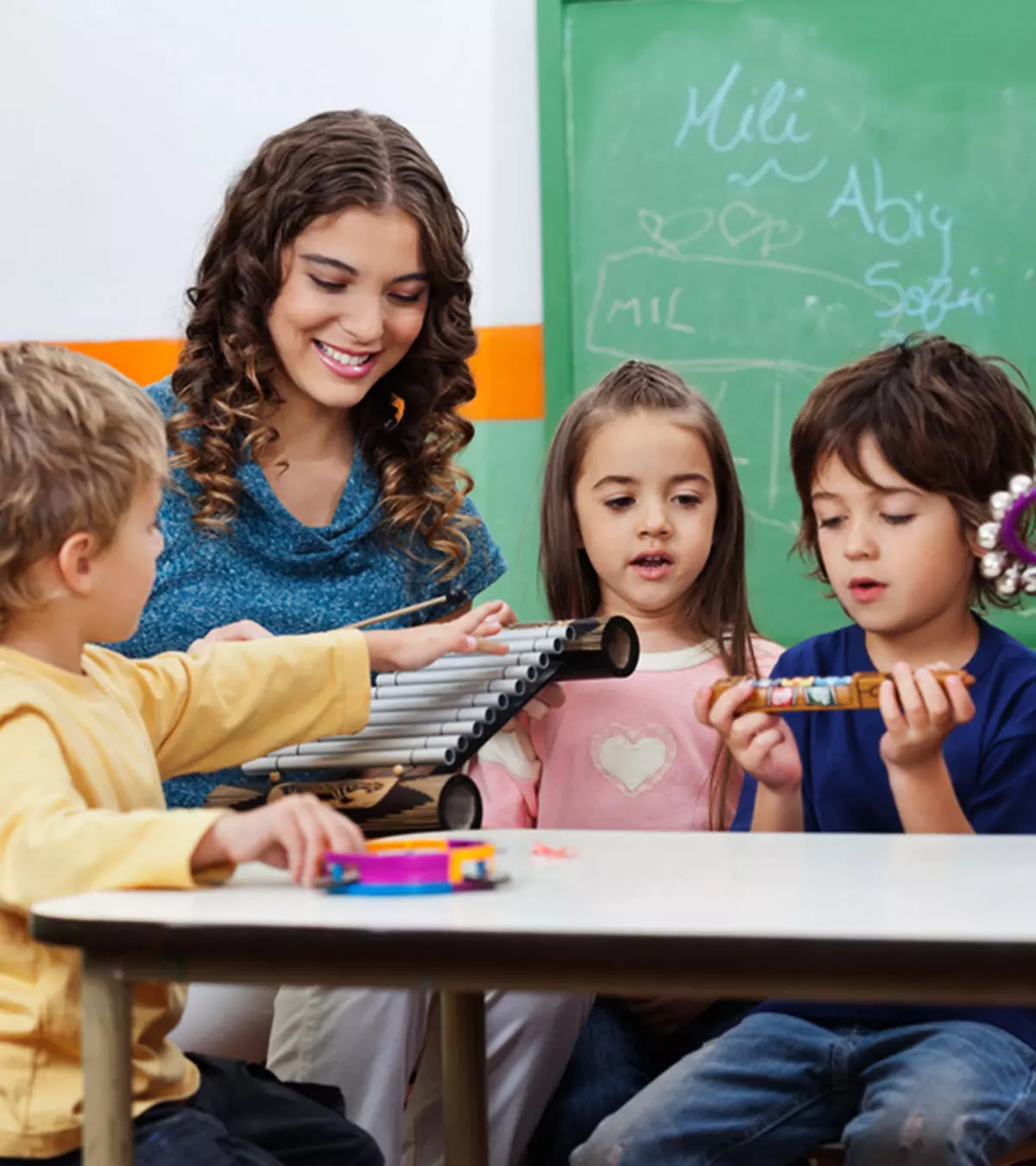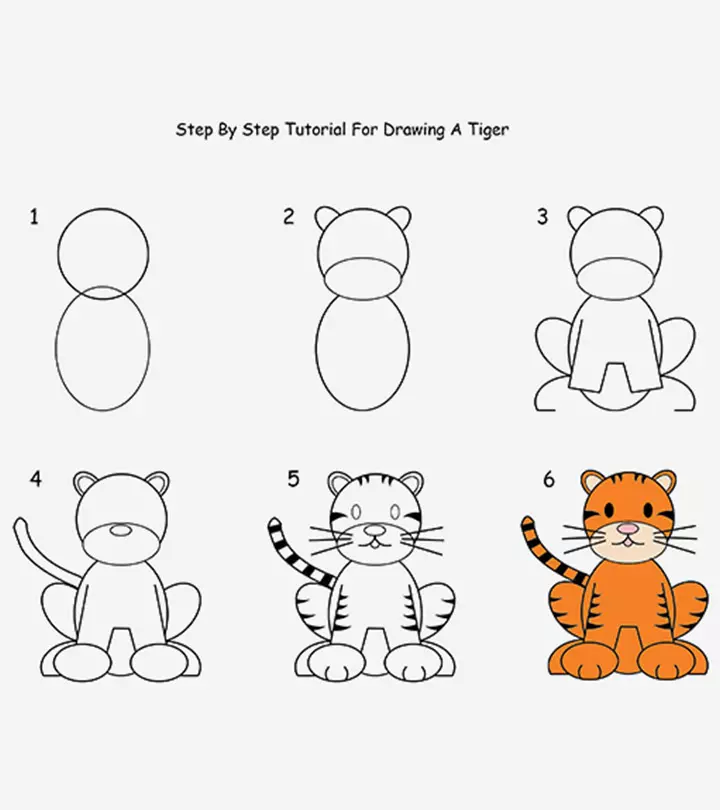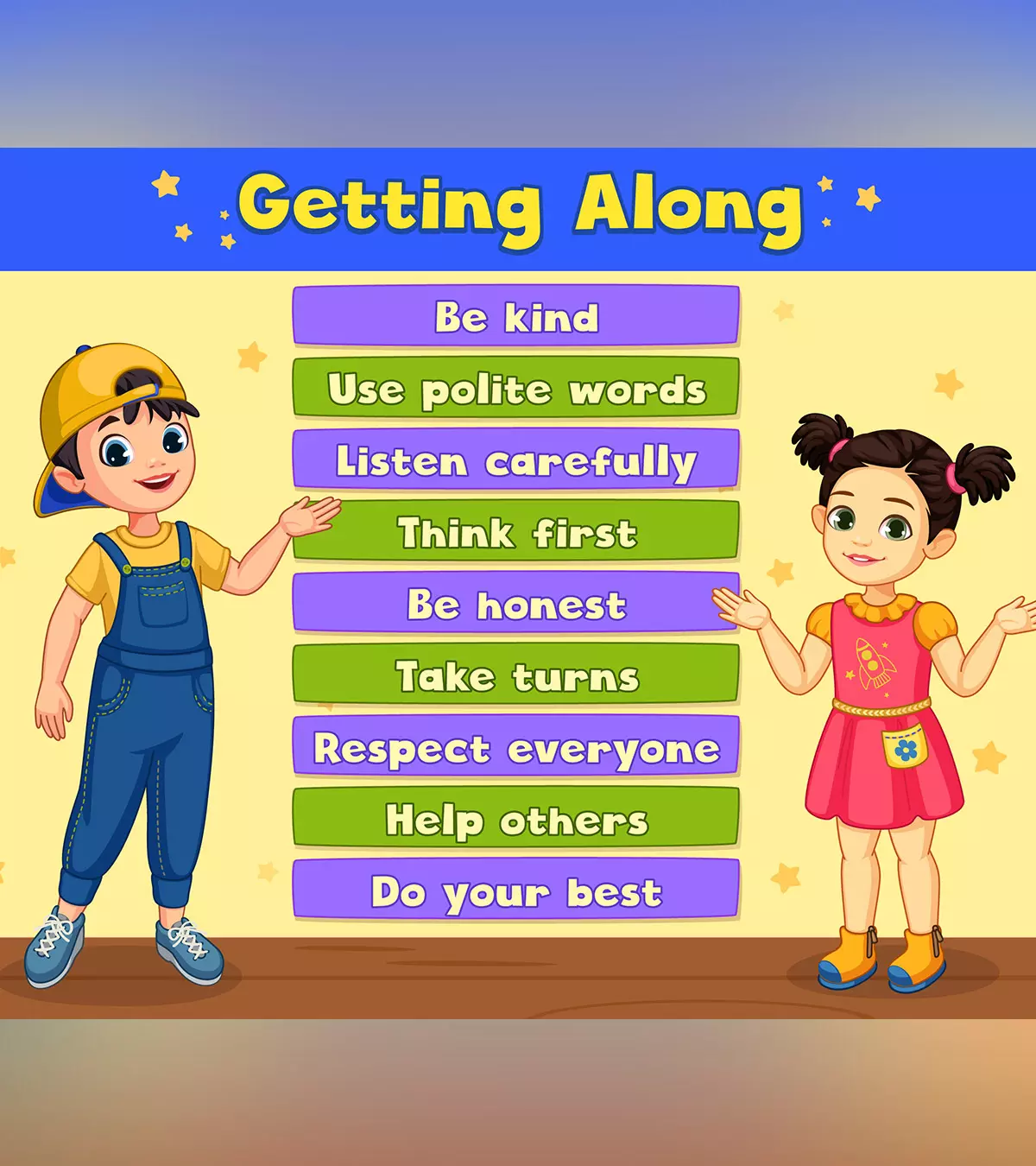
Image: ShutterStock
“Good manners are appreciated as much as bad manners are abhorred.”
– Bryant H. McGill
Good manners for kids are fundamental standards of practice that teach children how to act in a social setting. This knowledge is necessary for the development of an attractive personality, optimistic attitude, and socially acceptable behavior. It also aids in inculcating socializing and emotional skills, and moral values in kids. To acquire good manners, a youngster requires ongoing motivation, instruction, and support. This post discusses manners, their significance for children, and simple ways to instill them in your child.
Key Pointers
- Good manners go a long way in shaping children into good human beings and role models.
- Manners and etiquette are key to success in life as knowledge without character is futile.
- Being kind, helping, and apologizing are a few essential manners that every child must imbibe.
Importance Of Teaching Good Manners To Children
Good manners and social etiquette help the child learn how to behave appropriately in different situations. They not only foster respect and kindness but also lay the foundation for successful interactions throughout a child’s life, both personally and professionally. Furthermore, they help (1) (2):
- Teach the child to behave respectfully and be courteous with everyone, including those younger than them.
- Make positive relationships with elders, peers, and juniors, essential for personal, social, and emotional development.
- Enhance confidence and self-esteem by developing a socially appreciated demeanor.
- Boost communication skills that are necessary for the academic and professional growth of the child.
- Raise a responsible child who puts moral values into practical use and takes socially accountable decisions that benefit society.
- Shape a positive personality that keeps a child happy, cheerful, and motivated.
Ingraining manners in your child is an evolving process, and it needs time, patience, and persistent efforts. Following some simple ways and the right approach can help you do it with ease.
Ways To Teach Good Manners To Children
Guiding your child to practice good manners is an important task that needs your active involvement. Here are some simple steps that can ensure smooth and effective learning (3) (4).
- Practice what you preach: Children learn from their parents and families. So, be their role models and set the right examples by treating your elders, friends, family, and strangers with kindness, compassion, generosity, and respect. Be accommodating to others’ requirements. Modeling is vital as children readily learn from elders.
- Emphasize morality: Teach moral values to form a basis for choosing the right attitude and behavior. Instilling self-control, compassion, kindness, and empathy are some moral values for kids that teach them to stay calm and respond positively toward others even when they feel anxious, impatient, or angry.
- Help them practice their manners: Children learn best by doing, so let them use their learning in practical situations. Guidance is required on practicing table etiquette, keeping oneself clean, talking politely with others, and seeking permission wherever necessary. Utilize role-play scenarios where children can practice good manners in a safe environment. This will help them to internalize the lessons and apply them in real-life situations.
- Acknowledge good manners: Positive reinforcement is always helpful, so praise your child whenever they are well-behaved. Share it with other family members and let them appreciate the child, too. It will help boost the child’s self-esteem and confidence and motivate them to do better. It will also reinforce positive behavior in children, helping them grow into well-behaved individual.
- Give constructive feedback: Only teaching manners is not enough; you must also give your kids proper feedback to correct a behavior whenever necessary. Do not shout or be aggressive to correct the mistake. Instead, discuss negative behavior that you observed and suggest ways for improvement.
- Switch up your teaching mode: Use different media smartly to help children learn manners. Rhymes, poems, moral stories, and cartoon shows can help your child learn manners joyfully. All they need during this process is your guidance.
Following these steps persistently can help children learn good manners effectively.
25 Must-Learn Good Manners For Children
From a simple thank you to a selfless act of kindness, there are several habits parents should teach their children from a young age. People worldwide, including 85% of people in the UK, 84% in Australia, and 86% in Mexico, consider good manners to be something every child should learn (5). Children with good manners become respected individuals with a rewarding and happy life.
Expressing her appreciation for the lessons she learned as a child, Angela Barnard, an author, and cynical optimist, says, “My parents taught me how to say please and thank you, how to respect my elders and those around me, how to engage with others socially through kindness and compassion. They did not leave these things up to chance but were actively engaged parents, ensuring that I understood what normal acceptable social behavior was. Therefore, seeing as they got the basics right, they also gave me a foundation upon which I could build my life (i).”
So read through to know the ABCs of good manners and instill them in your children from an early age.
1. Be kind and helpful to all

Teach your child to be kind, generous, helpful, and empathetic to another person’s problems, and provide prompt help without any prerequisites. Sharing food with a classmate who forgot to bring his/her lunch, helping an older person cross the road, or assisting their mother in daily chores are some acts that can guide your child to be helpful.
2. Be polite to everyone
Politeness is a vital social skill that teaches your child to acknowledge another person’s feelings and talk respectfully. Studies show that children as young as 3 years old are capable of understanding and using polite markers in speech (6). This ability increases steadily with age (7). So, be it a face-to-face conversation or phone call, teach your child to talk softly and clearly. Motivate them to use words like “thank you,” “sorry,” “please,” “excuse me,” and “may I” in their daily conversation, from a young age.
 Quick tip
Quick tip3. Be honest in every situation

Teach honesty to your child by always being honest with them. It helps them observe and realize the ease of accepting mistakes over covering up and lying. Studies show that building trust with your children, by having them help you with small tasks, encourages them to be more honest and much less likely to cheat (8). Also, praise your child for their honesty whenever they show honesty and integrity, and share how proud you feel.
4. Practice sharing
Sharing one’s belongings, time, or other tangible and intangible items is an essential part of social living. It serves as a mark of care and compassion that boosts socio-emotional development. Participating in charity activities and sharing favorite toys/books/foods with siblings, cousins, and peers are a few ways to make the learning real.
5. Make introductions
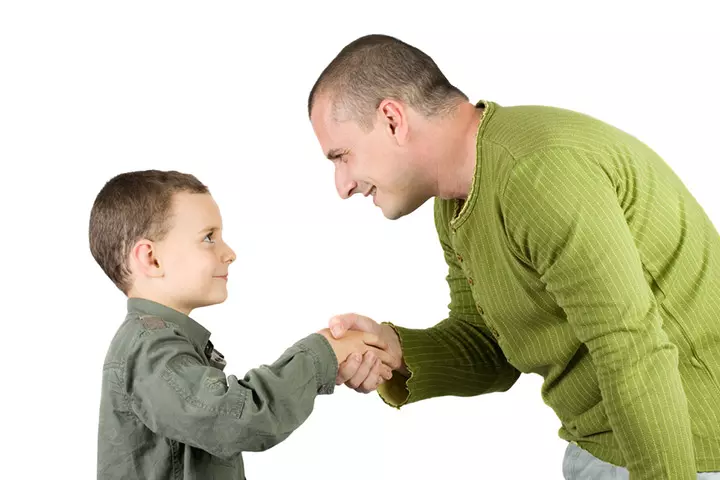
Making a proper introduction is an essential social skill that provides a way to initiate a conversation with others. Greet the person, share your name, and ask their name – these are the basic steps for children to progress towards more formal introductions. Motivate your child to introduce themselves to guests during social gatherings.
6. Listen carefully and wait for your turn
Listening carefully to others and taking turns to talk demonstrate respect for the person and the conversation. Teach your child to listen patiently from a young age as it helps in self-regulation and proper communication.
7. Make eye contact while talking

Making eye contact while talking is a sign of attention and respect toward the speaker and the conversation. Teach your child to avoid looking away, fiddling with hair, or chewing their nails during a conversation. Show them how doing so looks disrespectful and rude.
8. Respond to a question promptly
Responding to someone’s queries is a sign of acknowledgment and respect, whereas ignoring it is considered bad manners. Train your child to respond promptly by practicing the same with them. Listen to your child, acknowledge what they say, and respond appropriately.
9. Seek permission before taking anything
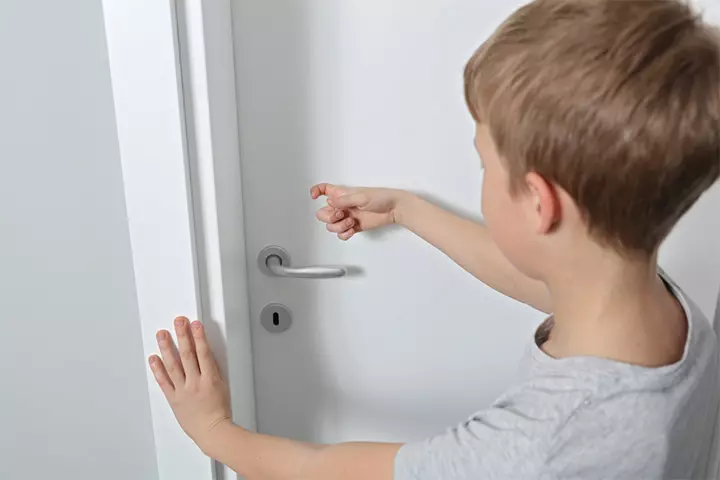
Asking for permission is a mark of respect to the individual, their personal space, and privacy. Knocking the door before entering someone’s room, seeking permission before using someone’s belongings, like their phone or pen, and starting a formal conversation with words, like “shall we start” or “may I” are good examples to follow.
10. Cover mouth while coughing or sneezing
Coughing and sneezing are potential ways of spreading infection. Thus, covering your mouth using a napkin, handkerchief, or mask while sneezing or coughing is considered hygienic and good manners. Teach your child to practice this habit from a young age.
11. Learn to seek apology
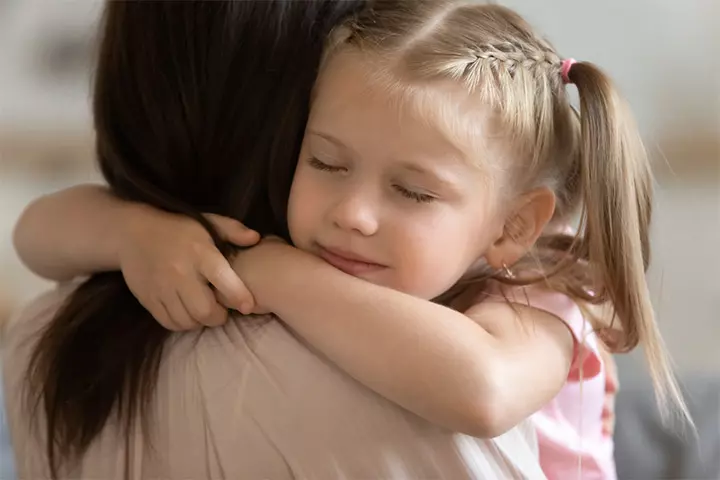
Sneezing between a conversation, burping during a meal, laughing loudly in a quiet place, and breaking an item by mistake are instances where seeking an apology is a mark of respect. Guide your child to use words like “excuse me,” “I am sorry,” “I apologize,” and “pardon me” whenever such instances occur. Tell them that an apology is a way to acknowledge mistakes respectfully. Of course, it is even more necessary to teach your child to apologize when they make a moral transgression. It is how children learn to take responsibility, acknowledge harm, and understand others’ perspectives.
12. Do not stare or point at anyone
Children stare and point at things or people out of amazement or curiosity. They are not aware that doing so can make someone feel uncomfortable and intimidated. Therefore, it is important to tell them that staring and pointing at others is bad manners.
13. Take care of elders
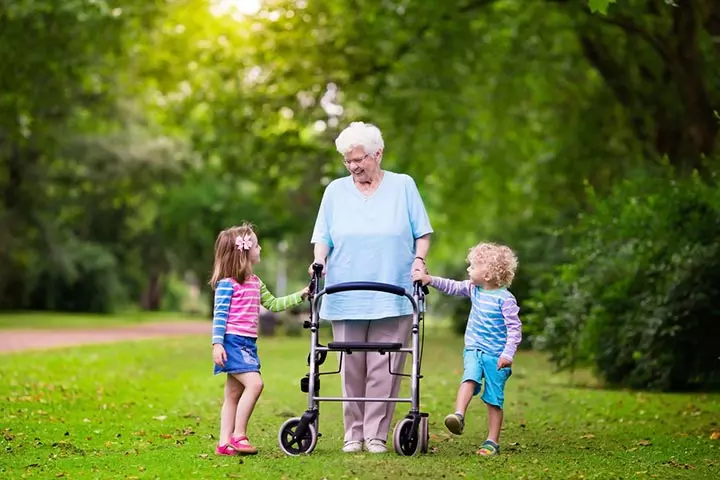
Caring and respecting elders is essential learning that makes a child responsible and dependable. Helping parents in daily chores, like folding clothes, cleaning the house, cooking food, and setting the table, are examples that children can follow.
 Point to consider
Point to consider14. Do not make fun of others
Laughing at someone’s weaknesses or bullying them for fun is insensitive, disrespectful, and hurtful. Teaching compassion, kindness, and sensitivity can help a child acknowledge others’ flaws and weaknesses respectfully.
15. Practice phone etiquette

Greeting the other person on a call and listening to them carefully while they talk is good manners. Instruct your child to keep their tone soft and voice audible while talking on the phone. For closing the call, help them practice words, like “goodbye” or “thanks for calling” appropriately.
16. Use honorific titles
Encourage your child to use honorific titles, like “Mr” and “Ms” before calling an elder by their last name. Honorific titles are used to refer to a person with respect. In some cultures, addressing elders as “Sir” or “Ma’am” may be preferred. So, guide your child appropriately.
17. Follow sportsmanship

The sportsman spirit is all about acknowledging another person’s success with grace and humility. This ethical practice makes a child disciplined and resilient to avoid negative emotions, like jealousy, hatred, and revenge, that might lead to unethical behavior, like cheating.
18. Do not mistreat differently abled
Individuals with long-term physical, mental, intellectual, or sensory disabilities are known as differently abled. Teach your child to treat such people with compassion, kindness, and respect to make them feel confident.
19. Be a considerate guest

A good guest adheres to their host’s house rules and maintains the necessary decorum. Speaking and listening to the host respectfully, observing and following their table manners, helping in household chores, and thanking the host family before leaving are a few examples to discuss and put to practice from a young age.
20. Never argue with elders
Arguing with elders should be discouraged from a young age. Encourage them to practice self-regulation, patience, and perseverance whenever they experience frustration towards a decision made by elders. Motivate your child to share their issues, concerns, and problems through healthy discussions.
21. Follow table manners
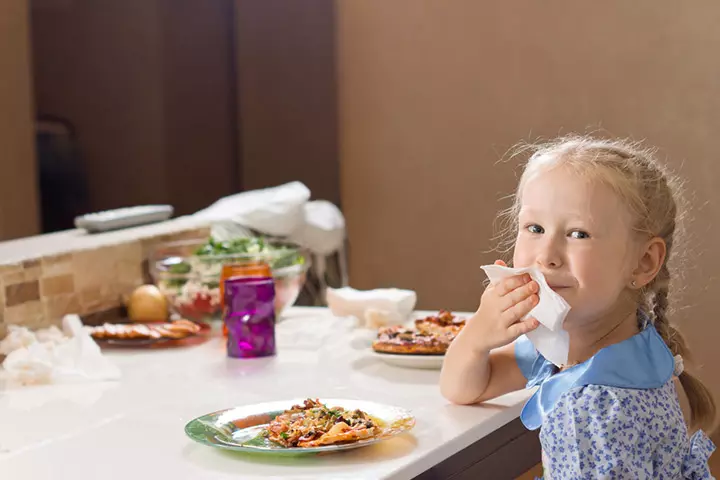
Guide your child to follow table manners and etiquette. Not speaking while chewing food, putting a napkin on the lap, chewing with your mouth closed, and saying “please pass…” if you need something are some simple table manners for kids that you can teach your child from a young age. As the child grows, progress towards formal rules, like the correct way to hold a fork and knife, etc.
22. Do not use foul language
Young children observe and imitate what they hear or see. Therefore, refrain from using foul language or inappropriate gestures in front of the child. Children may pick foul words at school or while playing with friends. Studies show children pick up swear words by 2, and by the time they start school, they may know as many as 35-40 swear words (9). Teach your child to not use such words. Discuss and explain how foul language can be disrespectful and hurtful to others.
23. Maintain adequate hygiene

Washing hands before and after meals, washing fruits before eating, not spitting on the roads, throwing waste in the dustbin, etc., are some basic habits that are considered good manners. Guide and train your child to follow these habits to become a socially responsible individual.
24. Write thank-you notes
Writing a thank-you note is an important social etiquette that shows your gratitude, respect, and affection for someone’s gift or service. Involving your child in writing a gracious thank-you note can help them understand its importance effectively. This also helps them cultivate the ability to practice gratitude.
25. Return the borrowed items
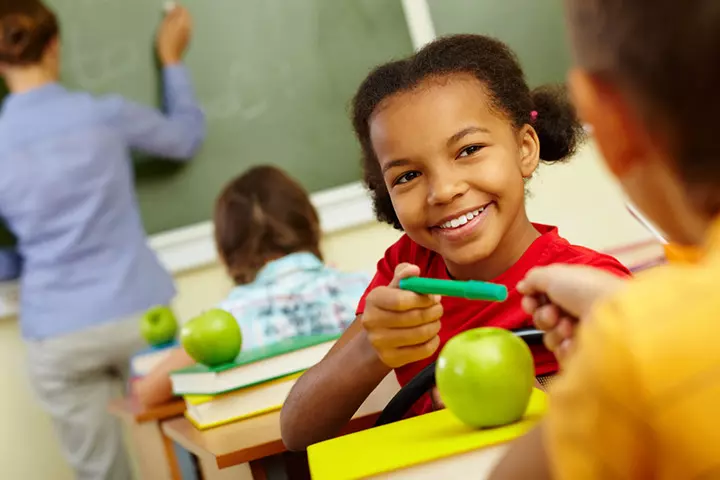
Whether it is a pencil, pen, dress, book, or lunchbox, train your child to be responsible and return the borrowed item as soon as its use is over. Remind them to thank the person who lent them the object. Practicing this basic habit is considered a good manner since it displays courtesy.
Long-Term Benefits Of Learning Good Manners For Kids
The benefits of good manners for kids go far beyond knowing proper table etiquette or being polite in social situations. Having good manners sets up a child for success, ensuring they grow up to be respected and well-adjusted adults. Here’s how:
- Improved social skills and relationships: Kids who incorporate phrases like ‘please’ and ‘thank you’ in everyday conversations are perceived as polite and cordial regardless of who they are talking to, and respect people’s personal spaces, form positive and long-lasting relationships. They are deemed more likable and approachable, which helps them build strong friendships and companionships, and later on, professional relationships.
- Better emotional regulation and self-control: Practicing good manners, like waiting for someone to finish before speaking, helps kids become more patient and have more emotional control. Continued implementation of these practices ensures that kids learn to control their impulsive behavior and handle all social situations respectfully.
- Increased self-confidence and positive self-image: When kids know how to behave with decorum and propriety in a variety of situations, they feel competent and confident. This helps them feel comfortable and secure in their skin, making them less anxious and awkward when interacting with people they know and when making new acquaintances.
- Improved academic and professional success: Kids who have better manners are more focused and disciplined, and show respect for authority figures, which helps with academic performance. In later life, these skills transform into professionalism, teamwork, good work ethic, and effective communication, making them more likely to succeed professionally.
- Stronger moral foundation: Kids raised to practice good manners show empathy, kindness, and respect. As they grow up internalizing these values, they develop a strong moral compass, which helps them make more ethical decisions as adults.
- Better social impressions and adaptability: Polite and well-mannered children make good first impressions, opening doors for them in personal and professional settings. They are more likely to be accepted and respected by colleagues and peers, helping them adapt easily and thrive in new environments.
- Enhanced problem-solving skills: When kids learn to be courteous and considerate, they become better listeners, helping them handle conflict with grace and tact. They develop good negotiation skills, which helps them resolve disagreements peacefully. This ultimately helps them have healthier relationships.
Frequently Asked Questions
1. What’s another word for good manners?
Other words that embody good manners include, respect, graciousness, etiquette, politeness, courtesy, and social graces.
2. Are good manners important to lead a successful life?
Good manners are a key factor in leading a successful life. They not only help create a positive impression on those around you, but also foster self-confidence and self-esteem by providing positive feedback on your behavior. So, practicing good manners is a great way to set yourself up for success!
3. What are some common examples of bad manners in kids and how can they be corrected?
Frequent interruptions while speaking, not saying “please” and “thank you,” poor table manners, not respecting personal space, being impolite, and not listening attentively, are a few examples of bad manners in children. They can be corrected by leading by example, communicating your expectations, reinforcing positive behavior, and encouraging empathy.
4. At what age should parents start teaching good manners to their children?
Parents can start teaching good manners to their children as soon as they learn to speak, as it is never too early to introduce basic etiquette. However, remember that every child develops at their own pace, so adapt the teaching approach to your child’s abilities and understanding.
5. What role do schools play in teaching good manners to kids?
Schools provide a structured setting where children regularly interact with their peers and teachers. This socialization helps children develop social skills, rules and manners through daily interactions, group activities, discipline, guidance, and teamwork.
6. How can parents handle situations where their child exhibits bad manners in public?
First, parents need to remain calm and composed in such situations. Also, address the behavior privately as it avoids shaming or embarrassing them. Parents can also provide immediate feedback to help them convey the impact of their actions on others and encourage apologizing for their mistakes.
7. What examples of non-verbal communication can convey good manners, and how can parents teach their children to recognize them?
Maintaining eye contact when speaking or listening to others, smiling, good posture and body language, active listening, good table manners, and appropriate dressing are non-verbal cues conveying good manners. Parents can explain what each non-verbal cue represents, engage in role-playing scenarios, and lead by example for their children to learn.
It is necessary to teach good manners to kids to avoid embarrassment in social settings. Young children may not be aware of right and wrong manners. Hence, you should teach them proper manners, such as being noble, helpful, and polite, respecting others, sharing, being honest, seeking permission, and responding to questions. You could also teach them how to introduce themselves, make good eye contact, and listen and wait for their turn. Moreover, since parents are role models for children, set a good example for your little ones to help them imbibe these manners faster.
Infographic: Teaching Good Manners To Children
Good manners form the basis for good behavior and the long-term personality development of a child. You can save this infographic for it gives the essential information about:
- Good manners children must learn
- Ways to teach good manners to children
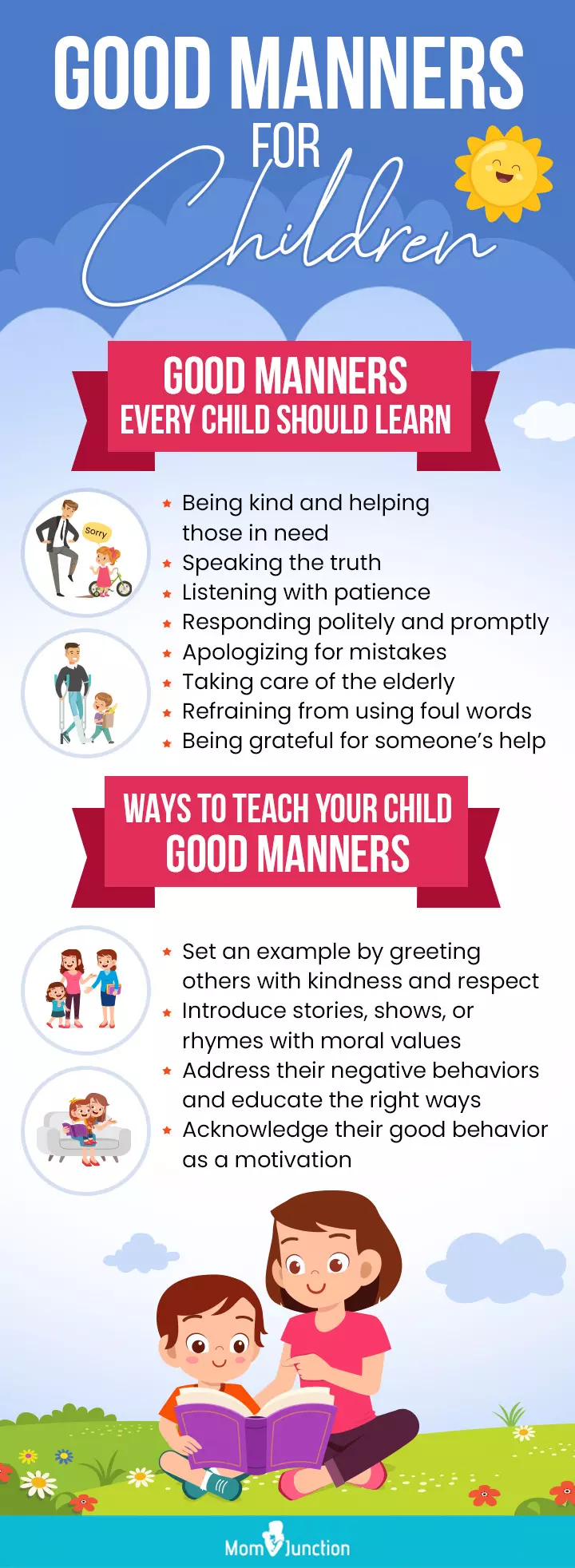
Illustration: Momjunction Design Team
Illustration: Good Manners For Kids To Learn And Follow
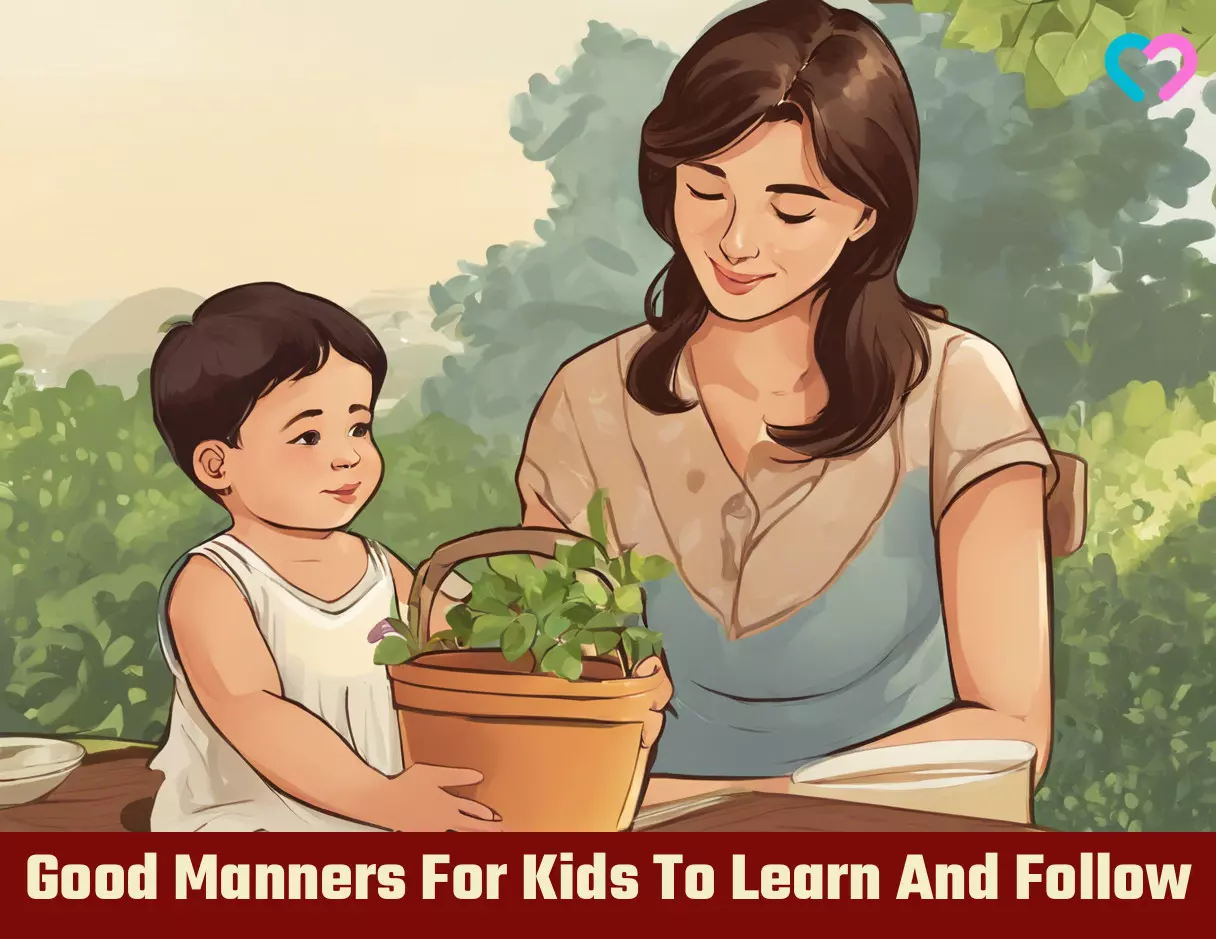
Image: Stable Diffusion/MomJunction Design Team
Good manners are important for kids to learn. This video can teach kids good manners in all spheres of life.
Personal Experience: Source
MomJunction articles include first-hand experiences to provide you with better insights through real-life narratives. Here are the sources of personal accounts referenced in this article.
i. 5 lessons I want to thank my parents for teaching me;https://medium.com/@angela_74200/5-lessons-i-want-to-thank-my-parents-for-teaching-me-c4bc176fb655
References
- Good Manners; Michigan State University
- The power of good manners; Michigan State University
- Helping Your Child Become a Responsible Citizen; Institute of Education Sciences
- How to Teach Good Behavior: Tips for Parents; AAFP
- Good manners, obedience and unselfishness: data reveals how UK parenting priorities compare with other nations; King’s College London
- Erica Yoon, et. al.; Preschool children’s understanding of polite requests; Proceedings of the Annual Meeting of the Cognitive Science Society
- Linda S. Al-Abbas; Politeness strategies used by children in requests in relation to age and gender: a case study of Jordanian elementary school students; Frontiers in Education
- New Study Finds Children’s Honesty Encouraged by Trust; Harvard Graduate School Of Education 9.
- The Science of Swearing; Association for Psychological Science
Community Experiences
Join the conversation and become a part of our nurturing community! Share your stories, experiences, and insights to connect with fellow parents.
Read full bio of Dr. Holly Schiff
Read full bio of Sagari Gongala
Read full bio of Harshita Makvana
Read full bio of Kavita Kankani












